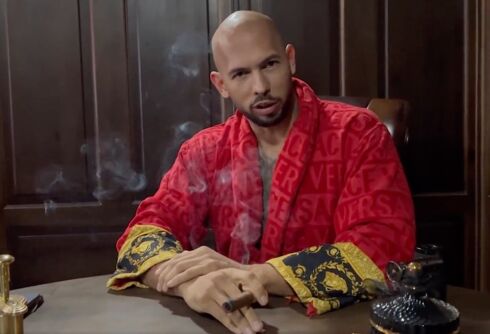Today marks what would have been the 100th birthday of Alan Turing, a brilliant British mathematician and computer scientist who was highly influential in the creating what would become the modern computer, and is most famous for his work on breaking the German Enigma codes during World War II.
Turing is widely considered to be the father of computer science and artificial intelligence.

Turing was also gay, and in 1952 was criminally prosecuted by his homeland for “homosexual acts” — he died of cyanide poisoning on June 7, 1954 in what was ruled a suicide.
In 1952, after he had reported a petty burglary, Turing found himself being investigated for “acts of gross indecency” after he revealed he had had a male lover in his house — homosexual acts were still illegal in the United Kingdom.
Never Miss a Beat
Subscribe to our newsletter to stay ahead of the latest LGBTQ+ political news and insights.
Faced with the prospect of imprisonment, and perhaps with it the loss of the mathematics post he held at Manchester University, which gave him access to one of the world’s only computers, Turing accepted the alternative of “chemical castration” — a series of injections of female hormones that were supposed to suppress his sexual urges.
It is often repeated that the chemicals caused him to grow breasts, though Turing is only known to have mentioned this once.
Turing died in 1954, just over two weeks prior to his 42nd birthday, from cyanide poisoning. His housekeeper found him in his bed, with a half-eaten apple on his bedside table.
An inquest determined it was suicide, although his mother and others believed his death was accidental.
It is widely said that Turing had been haunted by the story of the poisoned apple in the fairy tale of “Snow White and the Seven Dwarfs,” and had resorted to the same desperate measure to end the persecution he was suffering as a result of his homosexuality.
In 2009, then British Prime Minister Gordon Brown responded to growing demands for justice for Turing, and issued a public apology for Turing’s treatment by the British government:
“It is no exaggeration to say that, without his outstanding contribution, the history of the Second World War could have been very different. He truly was one of those individuals we can point to whose unique contribution helped to turn the tide of war.
“The debt of gratitude he is owed makes it all the more horrifying, therefore, that he was treated so inhumanely.”
In December 2011, a petition containing more than 34,000 signatures requested that the British Government pardon Turing for his conviction of “gross-indecency.”
The request for a posthumous pardon was declined because, according to the government, Turing was properly convicted of what at the time was a criminal offense, and “would have known that his offense was against the law and that he would be prosecuted.”













